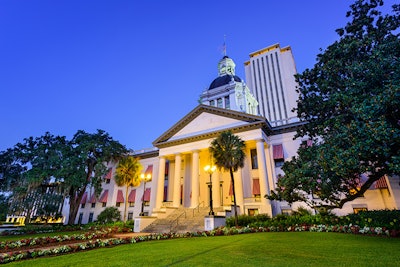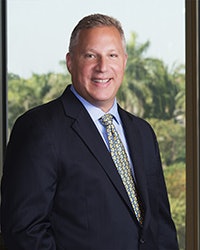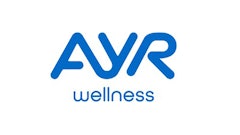
Seth Hyman has not only worked to build law firm Kelley Kronenberg’s Regulated Substances Practice Group to help Florida cannabis businesses become established, but he has also been appointed as a patient advocate on Broward County’s Medical Marijuana Advisory Board, and his journey began with his 12-year-old daughter Rebecca, who suffers from a severe genetic disorder called 1P36 Deletion Syndrome.
Rebecca cannot walk or talk, is neurologically visually and hearing impaired and suffers from intractable epilepsy. After trying many prescription pharmaceuticals and being unsatisfied with the results, Hyman found a group of parents in California who were giving their children a low-THC, high-CBD oil to help treat epilepsy. When bringing the oil back to Florida was not a legal option, Hyman and other parents with medically complex children went to Tallahassee and lobbied the Florida legislature to pass legislation to allow medical marijuana in the state.
After legalization, Kelley Kronenberg hired Hyman to help build its Regulated Substance Practice Group.
“For me, I have two interests—one is, I have an interest as a patient advocate for not only my daughter but for other patients, but then on the flip side, on the business component, my full-time job is working for a law firm who has been in the medical marijuana space since 2014, but it’s been a very slow go,” Hyman said.
After speaking on the topic of medical cannabis throughout the state with Kelley Kronenberg, Hyman was appointed to the Broward County Medical Marijuana Advisory Board, which he said was a perfect fit.
“It’s a very humbling and exciting opportunity for me to hopefully make a difference in many people’s lives,” he said.
Here, Hyman discusses how his journey in the medical marijuana industry aligns with the rollout of Florida’s program.
Cannabis Business Times: Can you describe your background? How have you assisted in the lawmaking process in the state, and how did you become involved with the advisory board?

I remember when the senate bill was coming up for a vote, my wife and I along with my daughter in her wheelchair with her oxygen tank, we went into one of the senators’ offices at about 5:30 at night. They were going to vote on the bill the next day. We sat down with these two Republican [legislators]. They said to me, “Listen, Mr. Hyman, we understand your situation. We feel for you.” Most people have no clue what parents like us go through. And they looked at us, and they said, “We feel for you, we have an idea of what you go through, but I can tell you right now this bill is not going to pass.” After speaking with them for an hour, at the end of the meeting, they looked at each other, and they said, “Mr. Hyman, after hearing your story, after sitting here in front of your daughter Rebecca and looking in her eyes, there is no way we’re going to vote no on this bill tomorrow. You will have our vote.”
And sure enough, the Compassionate Medical Cannabis Act of 2014 passed Florida legislature and eventually was signed by the governor. And that was the beginning of medical marijuana in the state of Florida. It was before Amendment 2 passed, which it did in 2016. What I like to emphasize is it was the faces of the children and the voices of the parents that made it happen. I sometimes feel that that’s being forgotten, but if you really look closely at Florida medical marijuana and the whole program, it started with children, and it just shows you the impact the silent voices of children who are medically complex can have.
CBT: What does it mean to be a “Patient Advocate” on the board?
SH: I believe it’s a great opportunity for me to share my experience and knowledge that I’ve obtained over the last four years. I could hopefully provide first-hand experience on what I’ve learned and what I’ve seen with patients, and the advisory board and the commission could take my personal experiences and hopefully establish certain regulations and policies that would be beneficial for the patients.
Access is important. Product availability is important. And I also think it’s important for us to differentiate between, [the county laws and] the overall laws for medical marijuana in Florida [that] are made by the Florida legislature. You have laws made by the state, and then you have laws made locally by counties, municipalities, and in our case, it’s Broward County. It’s one of Florida’s largest counties. I think locally, my voice and my experience—my stories, my experience using products with my daughter—could truly help the community.
CBT: What do you think is working well in the state’s medical marijuana program?
SH: If you have the opportunity to speak to medical marijuana advocates or patients and you ask them this question, most of them will say there’s not much working well here in Florida, unfortunately, because there have been so many lawsuits against the state of Florida. There have been so many hiccups in the rollout of the medical marijuana program that many would view it as a program that needs a lot of work.
Recently, Florida patients had to wait anywhere between 45 and 90-plus days after they saw a doctor to get their card to go to a Medical Marijuana Treatment Center [MMTC]—what the dispensaries are called here in Florida—to actually get their medicine. Three months ago, I was working with a stage-four cancer patient who was terminally ill, dire pain, suffering beyond anything I’ve ever seen, and three months went by and they still did not get their card. That has been a huge issue for the state, but recently, the state is trying to work with a third-party issuer of cards—they were doing it themselves before—and from what I hear, the turnaround time now has been improved. I think the state says it should be 20 days if you do it online and 30 days if you do it offline, if you mail in the application with your photo. Well, 30 or even 45 days is a lot better than 90. I think the state needs to continue to work toward the turnaround time and the process for providing the cards for the patients since so many of these patients are in desperate need of medicine today, not in 45 days or 60 days.
What’s good is that Florida has over 70,000 patients now registered. In the first year of a true rollout, that’s pretty amazing. From what I hear, that’s probably better than many medical states, if not all the medical states out there. Patients are there, they want to get their cards and the fact that we have such a high count so quickly [is] a good thing.
I think it’s [also] working well for the license holders. Again, it’s been very limited to the good. I think probably if you said, “Well, what is the one thing that’s working well in the state of Florida for the medical marijuana program?” I could say that cannabis is available. Just the fact that there’s a program in place where a patient has the right, providing they have one of the qualifying conditions, to get medicine, I think that in itself is a major victory for the patients and the people of the state of Florida.
CBT: What changes do you hope to see implemented the program?
SH: There definitely needs to be more product choice. Products are very, very limited.
More MMTCs [need to] get online quickly because here in Florida, we’re allowed to have 18. Right now, there are maybe only four that are fully operational.
We desperately need to expand the qualifying medical conditions. Right now, I believe there are 10, and there are still hundreds of thousands of people who could potentially benefit from the use of cannabis whose doctors are afraid to order it for them because their particular condition is not one of the 10, but yet their symptoms could be identical to one of the 10. Here in Florida, there is an “other,” and it basically says if the doctor deems that you’ve tried everything, nothing else works, OK, you can try cannabis. There’s a process.
Flower—real flower, not processed, ground-up flower in a tamper-proof container—needs to be available, and that’s really what’s coming to the market here: ground-up flower in tamper-proof containers that can only be vaporized. There are many patients who can’t benefit from that. They need a particular flower, they need to take their medicine the way they need to take care of them. [In] many other states, I think flower is an important component.
Edibles are technically legal here in the state of Florida, but because the state legislature, Department of Health and all the appropriate governing agencies have not devised certain standards into the production and distribution of edibles, edibles are not available. Until they come out with those standards, producers cannot make edibles, which is a big problem for many patients.
Many patients are scared to use a vaporizer. They might not feel comfortable for whatever reason taking a tincture or a pill. That really needs to be worked on.
CBT: What recommendations do you look forward to sharing with the county commissioners?
SH: I think what’s important for the county commissioners to keep in mind is that if patients are not able to obtain medicine within a reasonable distance from their home, they’re going to leave the city or town or county where they live, and they’re going to go somewhere else. What happens when they leave and go elsewhere? What happens if they need to do some shopping? If they’re leaving your local community and going elsewhere, there’s a good possibility they’re going to do their shopping and spend their dollars outside of their community. What I try to share with legislators is that here in Florida, we have very strict regulations on the do’s and don’ts of opening up an MMTC. They’re very sophisticated, they’re very complementary to the communities that they serve and the more and more cities and counties have moratoriums on allowing MMTCs in their community, [the more] they’re driving their citizens elsewhere.
Safety is always an issue. That’s been spoken about a lot because of the cash situation.
I know [the commissioners are] taking all of this into consideration, and I think issuing recommendations of what the patients need and what’s important to them will potentially be a good thing. That’s what I’m looking forward to providing.
Editor’s Note: This interview has been edited for length and clarity.
Top image: © SeanPavonePhoto | Adobe Stock; Seth Hyman headshot courtesy of Seth Hyman


























